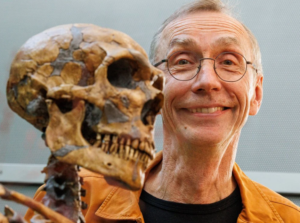By Aislinn Sanders

On October 3rd, 2022, Svante Pääbo was awarded the Nobel Prize in Physiology or Medicine for his work on ancient human genomes.
Pääbo’s work on the hominin genome founded the new scientific discipline of paleogenomics, a field whose aim is to reconstruct and analyze the genomes of extinct species. This breakthrough was previously thought impossible due to DNA’s relatively short life before chemical modifications set in and the strands begin to break apart. His research began in 1990 to decode mitochondrial DNA from a 40,000-year-old bone fragment in 2010, Pääbo published the first Neanderthal genome sequence. He then compared this to modern day humans and found that it was more similar to humans from Europe and Asia, indicating that Homo sapiens and Neanderthals interbred in these regions. Additionally, Pääbo is credited with the discovery of the Denisovans, a previously unknown hominin species who may have lived 30,000 to 200,000 years ago. Prior the Neanderthals, he worked with mummies and extinct animals.
Pääbo’s research allows us to better understand how ancient humans have affected modern humans physiologically and opens the door to the possibility of other Homo sapiens/extinct hominin interbreeding, though no other extinct hominin genomes have been sequenced yet due to degradation of DNA and the need for increasingly advanced technology. In 2019, Pääbo and his colleague Hugo Zeberg linked a gene found in Neanderthal DNA to an increased likelihood of severe Covid-19 symptoms for European and Asian populations.
Studying ancient humans allows researchers to find links to modern day health and diseases. The work on these ancient human genomes allows scientists to pinpoint what, precisely, makes humans unique.